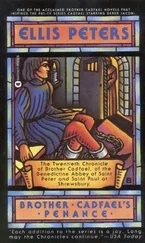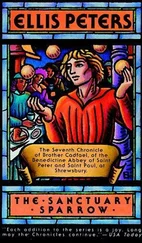Ellis Peters - A Rare Benedictine
Здесь есть возможность читать онлайн «Ellis Peters - A Rare Benedictine» весь текст электронной книги совершенно бесплатно (целиком полную версию без сокращений). В некоторых случаях можно слушать аудио, скачать через торрент в формате fb2 и присутствует краткое содержание. Жанр: Исторический детектив, на английском языке. Описание произведения, (предисловие) а так же отзывы посетителей доступны на портале библиотеки ЛибКат.
- Название:A Rare Benedictine
- Автор:
- Жанр:
- Год:неизвестен
- ISBN:нет данных
- Рейтинг книги:5 / 5. Голосов: 1
-
Избранное:Добавить в избранное
- Отзывы:
-
Ваша оценка:
- 100
- 1
- 2
- 3
- 4
- 5
A Rare Benedictine: краткое содержание, описание и аннотация
Предлагаем к чтению аннотацию, описание, краткое содержание или предисловие (зависит от того, что написал сам автор книги «A Rare Benedictine»). Если вы не нашли необходимую информацию о книге — напишите в комментариях, мы постараемся отыскать её.
A Rare Benedictine — читать онлайн бесплатно полную книгу (весь текст) целиком
Ниже представлен текст книги, разбитый по страницам. Система сохранения места последней прочитанной страницы, позволяет с удобством читать онлайн бесплатно книгу «A Rare Benedictine», без необходимости каждый раз заново искать на чём Вы остановились. Поставьте закладку, и сможете в любой момент перейти на страницу, на которой закончили чтение.
Интервал:
Закладка:
“You have not failed, Father,” said Cadfael simply. “The suit is still unheard, and will be for three days more. All your companions are safe in Woodstock, except that they fret and search for you. And if you know where they will be lodging, I would recommend that you join them now, by night, and stay well out of sight until the day the case is heard. For if this trap was designed to keep you from appearing in the King’s court, some further attempt might yet be made. Have you your evidences safe? They did not take them?”
“Brother Orderic, my clerk, was carrying the documents, but he could not conduct the case in court. I only am accredited to represent my abbot. But, my son, how is it that the case still goes unheard? The King keeps strict day and time, it’s well known. How comes it that God and you have saved me from disgrace and loss?”
“Father, for all too bitter reason the King could not be present.”
Cadfael told him the whole of it, how half the young chivalry of England had been wiped out in one blow, and the King left without an heir. Prior Heribert, shocked and dismayed, fell to praying in a grieving whisper for both dead and living, and Cadfael walked beside the horse in silence, for what more was there to be said? Except that King Henry, even in this shattering hour, willed that his justice should still prevail, and that was virtue in any monarch. Only when they came into the sleeping town did Cadfael again interrupt the prior’s fervent prayers with a strange question.
“Father, was any man of your escort carrying steel? A dagger, or any such weapon?”
“No, no, God forbid!’ said the prior, shocked. “We have no use for arms. We trust in God’s peace, and after it in the King’s.”
“So I thought,” said Cadfael, nodding. “It is another discipline, for another venture.”
By the change in Mauduit’s countenance Cadfael knew the hour of the following day when the news reached him that his prisoner was flown. All the rest of that day he went about with nerves at stretch and ears pricked for any sensational rumours being bandied around the town, and eyes roving anxiously in dread of the sight of Prior Heribert in court or street, braced to pour out his complaint to the King’s officers. But as the hours passed and still there was no sign, he began to be a little eased in his mind, and to hope still for a miraculous deliverance. The Benedictine brothers were seen here and there, mute and sombre-faced; surely they could have had no word of their superior. There was nothing to be done but set his teeth, keep his countenance, wait and hope.
The second day passed, and the third day came, and Mauduit’s hopes had soared again, for still there was no word. He made his appearance before the King’s judge confidently, his charters in hand. The abbey was the suitor. If all went well, Roger would not even have to state his case, for the plea would fail of itself when the pleader failed to appear.
It came as a shattering shock when a sudden stir at the door, prompt to the hour appointed, blew into the hall a small, round, unimpressive person in the Benedictine habit, hugging to him an armful of vellum rolls, and followed by his black-gowned brothers in close attendance. Cadfael, too, was observing him with interest, for it was the first time he had seen him clearly. A modest man of comfortable figure and amiable countenance, rosy and mild. Not so old as that night journey had suggested, perhaps forty-five, with a shining innocence about him. But to Roger Mauduit it might have been a fire-breathing dragon entering the hall.
And who would have expected, from that gentle, even deprecating presence, the clarity and expertise with which that small man deployed his original charter, punctiliously identical to Roger’s, according to the account Alard had given, and omitting any specific mention of what should follow Arnulf Mauduit’s death how scrupulously he pointed out the omission and the arguments to which it might give rise, and followed it up with two letters written by that same Arnulf Mauduit to Abbot Fulchered, referring in plain terms to the obligatory return of the manor and village after his death, and pledging his son’s loyal observance of the obligation.
It might have been want of proofs that caused Roger to make so poor a job of refuting the evidence, or it might have been craven conscience. Whatever the cause, judgement was given for the abbey.
Cadfael presented himself before the lord he was leaving barely an hour after the verdict was given.
“My lord, your suit is concluded, and my service with it. I have done what I pledged, here I part from you.”
Roger sat sunk in gloom and rage, and lifted upon him a glare that should have felled him, but failed of its impact.
“I misdoubt me,” said Roger, smouldering, “how you have observed your loyalty to me. Who else could know…” He bit his tongue in time, for as long as it remained unsaid no accusation had been made, and no rebuttal was needed. He would have liked to ask: How did you know? But he thought better of it. “Go, then, if you have nothing more to say.”
“As to that,” said Cadfael meaningly, “nothing more need be said. It’s over.” And that was recognisable as a promise, but with uneasy implications, for plainly on some other matter he still had a thing to say.
“My lord, give some thought to this, for I was until now in your service, and wish you no harm. Of those four who attended Prior Heribert on his way here, not one carried arms. There was neither sword nor dagger nor knife of any kind among the five of them.”
He saw the significance of that go home, slowly but with bitter force. The masterless men had been nothing but a children’s tale, but until now Roger had thought, as he had been meant to think, that that dagger-stroke in the forest had been a bold attempt by an abbey servant to defend his prior. He blinked and swallowed and stared, and began to sweat, beholding a perilous gulf into which he had all but stumbled.
“There were none there who bore arms,” said Cadfael, “but your own.”
A double-edged ambush that had been, to have him out in the forest by night, all unsuspecting. And there were as many miles between Woodstock and Sutton Mauduit returning as coming, and there would be other nights as dark on the way.
“Who?” asked Roger in a grating whisper. “Which of them? Give him a name!”
“No,” said Cadfael simply. “Do your own divining. I am no longer in your service, I have said all I mean to say.”
Roger’s face had turned grey. He was hearing again the plan unfolded so seductively in his ear. “You cannot leave me so! If you know so much, for God’s sake return with me, see me safely home, at least. You I could trust!”
“No,” said Cadfael again. “You are warned, now guard yourself.”
It was fair, he considered; it was enough. He turned and went away without another word. He went, just as he was, to Vespers in the parish church, for no better reason or so he thought then than that the dimness within the open doorway beckoned him as he turned his back on a duty completed, inviting him to quietness and thought, and the bell was just sounding. The little prior was there, ardent in thanksgiving, one more creature who had fumbled his way to the completion of a task, and the turning of a leaf in the book of his life.
Cadfael watched out the office, and stood mute and still for some time after priest and worshippers had departed. The silence after their going was deeper than the ocean and more secure than the earth. Cadfael breathed and consumed it like new bread. It was the light touch of a small hand on the hilt of his sword that startled him out of that profound isolation. He looked down to see a little acolyte, no higher than his elbow, regarding him gravely from great round eyes of blinding blue, intent and challenging, as solemn as ever was angelic messenger.
Читать дальшеИнтервал:
Закладка:
Похожие книги на «A Rare Benedictine»
Представляем Вашему вниманию похожие книги на «A Rare Benedictine» списком для выбора. Мы отобрали схожую по названию и смыслу литературу в надежде предоставить читателям больше вариантов отыскать новые, интересные, ещё непрочитанные произведения.
Обсуждение, отзывы о книге «A Rare Benedictine» и просто собственные мнения читателей. Оставьте ваши комментарии, напишите, что Вы думаете о произведении, его смысле или главных героях. Укажите что конкретно понравилось, а что нет, и почему Вы так считаете.












